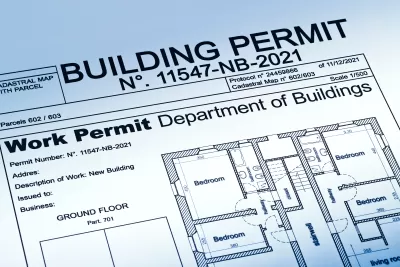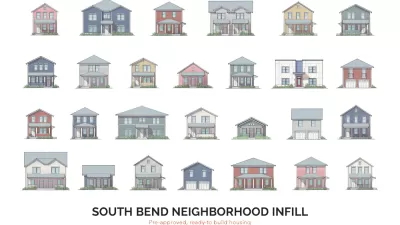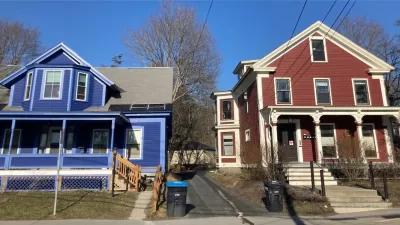Faced with blighted neighborhoods where the cost of building a house would exceed its eventual market value, the city of Kalamazoo, Michigan, streamlined the permitting process to help lower development costs.

By 2015, a state land bank program intended to fight blight had accumulated 267 derelict properties in Kalamazoo, Michigan. The problem? The cost of building a house eclipsed what its market value would be when finished. Without the financial incentive to build or improve homes in these neighborhoods, these areas just declined further, reports Ben Abramson of Strong Towns.
A coalition of city, county, and state agencies, along with housing developers, advocates, and nonprofits banded together to identify solutions to help them fill those vacant lots. The first fix: resolve the zoning issues that had rendered 67 percent of land bank acquisitions unbuildable and created financing hurdles for homeowners. The second solution: streamline the permitting process by creating a “pattern book” of pre-permitted housing plans and adding all required permits and inspections to the process, which effectively minimize costly variables and surprises.
After doing a proof of concept with a local nonprofit and ironing out some kinks, as of 2024, 48 homes have been built using Kalamazoo’s pre-permitted plans,” according to the Strong Towns article, including a stacked duplex, a four-bedroom standard house, a narrow house that can fit on a lot as small as 30 feet wide, and an ADU.
“Overall, KNHS says that in 2022, it helped 106 local residents buy or substantially improve their homes. It is also working to train local residents in the building trades to work on future projects,” Abramson writes. “Now the plans have been made available to small for-profit developers. In those cases they must prepay for all permits and inspections, but having access to proven, high-quality designs substantially lowers their upfront costs.”
FULL STORY: Pre-Permitted Plans Help Kalamazoo Bring Housing Back

Alabama: Trump Terminates Settlements for Black Communities Harmed By Raw Sewage
Trump deemed the landmark civil rights agreement “illegal DEI and environmental justice policy.”

Planetizen Federal Action Tracker
A weekly monitor of how Trump’s orders and actions are impacting planners and planning in America.

Why Should We Subsidize Public Transportation?
Many public transit agencies face financial stress due to rising costs, declining fare revenue, and declining subsidies. Transit advocates must provide a strong business case for increasing public transit funding.

Judge Orders Release of Frozen IRA, IIJA Funding
The decision is a victory for environmental groups who charged that freezing funds for critical infrastructure and disaster response programs caused “real and irreparable harm” to communities.

‘Clybourne Park’ Sets Stage for Housing Equity Discussions
Clybourne Park, a play exploring race, real estate, and community tensions, can set the stage for discussion on the lasting impacts of housing discrimination, gentrification, and the fight for affordability.

Understanding Road Diets
An explainer from Momentum highlights the advantages of reducing vehicle lanes in favor of more bike, transit, and pedestrian infrastructure.
Urban Design for Planners 1: Software Tools
This six-course series explores essential urban design concepts using open source software and equips planners with the tools they need to participate fully in the urban design process.
Planning for Universal Design
Learn the tools for implementing Universal Design in planning regulations.
Caltrans
Smith Gee Studio
Institute for Housing and Urban Development Studies (IHS)
City of Grandview
Harvard GSD Executive Education
Toledo-Lucas County Plan Commissions
Salt Lake City
NYU Wagner Graduate School of Public Service





























